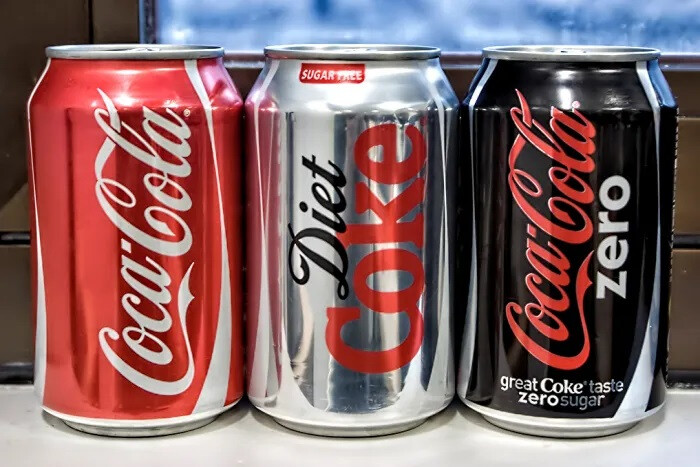
New research suggests that regularly consuming diet cola, often perceived as a healthier alternative, may significantly increase the risk of various health problems, including cardiovascular diseases, type 2 diabetes, and even certain cancers. The primary culprit identified is aspartame, a widely used artificial sweetener.
Initial findings, as reported by Fox 5 on July 1st, indicate that aspartame can disrupt the delicate balance of gut bacteria, potentially leading to increased risks of type 2 diabetes, weight gain, and heart disease. Michelle Ludenstein, a New York-based cardiovascular nutritionist, underscored the addictive nature of diet cola, noting that many individuals only fully grasp this dependency after discontinuing its consumption. Ludenstein also highlighted that the World Health Organization (WHO) has classified aspartame as a "possibly carcinogenic to humans" (Group 2B) substance, adding to concerns about its long-term health implications, including adverse effects on the gut microbiome.
Further studies corroborate these warnings, linking even a single can of diet carbonated beverage per day to an elevated risk of arrhythmia, an irregular heartbeat, which can consequently lead to severe vascular conditions such as stroke. Researchers emphasize that consistent intake of artificial sweeteners can be broadly detrimental to overall health.
Aspartame: A Closer Look at the Controversies
The classification of aspartame by the WHO's International Agency for Research on Cancer (IARC) as Group 2B in July 2023, based on limited evidence of a possible link to liver cancer in humans, has intensified the debate surrounding its safety. While the IARC focuses on the strength of evidence for carcinogenicity, it's crucial to note that other bodies, such as the Joint FAO/WHO Expert Committee on Food Additives (JECFA), maintain that aspartame poses no health concern at commonly used doses, and the U.S. Food and Drug Administration (FDA) continues to affirm its safety under approved conditions. This divergence in opinion underscores the ongoing scientific scrutiny and the need for further research.
Beyond potential carcinogenicity, aspartame's influence on the gut microbiome remains a significant area of research. While some studies suggest minimal impact due to its rapid metabolism, others indicate that it can alter microbial diversity, potentially increasing certain bacterial populations and impairing glucose metabolism, thus contributing to metabolic disorders.
The perceived "addictive" quality of artificial sweeteners, including aspartame, is another point of concern. Some theories suggest that aspartame, similar to sugar, can trigger the release of feel-good hormones like dopamine in the brain, leading to cravings and overconsumption. This isn't a physical addiction akin to drugs, but rather a behavioral pattern that can make it challenging to reduce intake. Additionally, research has explored links between aspartame consumption and mood swings, irritability, and even depression, suggesting a potential impact on neurobehavioral health. Concerns about its effects on kidney and liver health, and even early menstruation in young girls, have also been raised in some studies, although more conclusive evidence is often sought.
Environmental Footprint of Artificial Sweeteners
The ramifications of aspartame extend beyond human health to the environment. Aspartame has been identified as an emerging pollutant, primarily due to its resistance to degradation during conventional wastewater treatment processes. Once consumed, a significant portion of artificial sweeteners passes unchanged through the human body and enters wastewater systems. Consequently, they find their way into natural water bodies, posing a threat to aquatic ecosystems. Their persistence in the environment means they can have long-lasting consequences, affecting aquatic organisms and potentially entering the food chain. This highlights a broader environmental challenge posed by synthetic compounds that are not easily broken down by natural or industrial processes.
Healthier Beverage Choices
In light of these accumulating concerns, health experts advocate for a shift away from diet sodas and other artificially sweetened beverages towards healthier alternatives. Recommendations include:
Low-sugar kombucha: A fermented tea that can offer beneficial probiotics for gut health.
Sparkling water with natural flavorings: Adding slices of lime, lemon, cucumber, or berries to plain or sparkling water can create a refreshing and healthy beverage without added sugars or artificial sweeteners.
Unsweetened teas (green, herbal): These offer a variety of flavors and often come with antioxidant benefits.
Infused water: Water infused with fruits, vegetables, and herbs provides natural flavors and hydration without compromising health.
By opting for these natural and less processed alternatives, individuals can support better overall health, reduce their exposure to potentially harmful artificial ingredients, and contribute to a healthier environment. The growing body of research suggests that what we drink, even seemingly innocuous "diet" options, can have profound and far-reaching impacts on our well-being and the planet.
[Copyright (c) Global Economic Times. All Rights Reserved.]






























